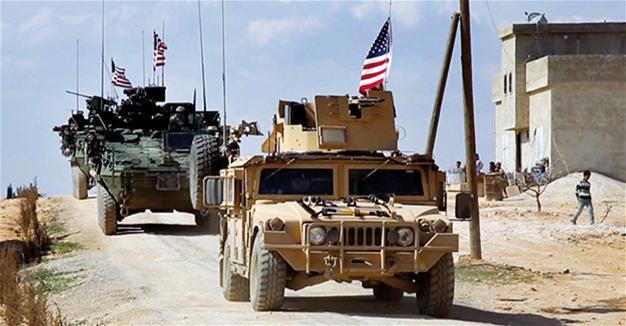Turkey urges US, Russia to cut support to YPG
Serkan Demirtaş - ANKARA

AP photo
Turkey has reiterated its desire to remove the Syrian Democratic Union Party (PYD) and its armed wing, the People’s Protection Units (YPG), from Manbij, urging both the United States and Russia not to support “terrorist groups” in Syria, just after the top soldiers of the three countries discussed the security situation in the war-torn country in a surprise meeting.
“What is important for us is to clear Manbij of YPG elements. Why did the YPG come there? To establish its terrorist canton and to gain more territory,” FM Mevlüt Çavuşoğlu said March 9.
“That’s why it wants to join the Raqqa operation. It won’t return after the DAESH [an Arabic acronym of the Islamic State of Iraq and the Levant] is kicked out of Raqqa,” Çavuşoğlu told Ankara bureau chiefs of media outlets on March 9.
“The YPG is using the fight against the DAESH as an opportunity,” Çavuşoğlu said, reiterating that Turkey would not permit the PYD to link its Kobane and Afrin cantons in northern Syria.
Following its victory in al-Bab, Turkey said its next target would be Manbij to push the YPG forces to the east of the Euphrates River; Russia, however, forced the Syrian Kurdish group to transfer control of the region to the Syrian government while the United States deployed more forces to the same area in a bid to halt a potential Turkish operation.
“If the Russians move to protect the YPG in Manbij or elsewhere, that would be a problem for us. We would oppose this. But if they move to clear the YPG then we would support it,” Çavuşoğlu said.
The foreign minister, however, recalled that the YPG’s deployment in Manbij was an issue between Turkey and the U.S. and not with Russia, underlining Turkey’s sensitivity with regard to the existence of a “terrorist group” right on the other side of its border. “For us, the priority is the YPG. It’s our sensitive issue,” he said.
As two allies, it is only natural that Turkey and the U.S. cooperate with each other and not with “terror organizations,” Çavuşoğlu said, adding that Ankara attached importance to working with Washington on all regional issues.
Turkey’s top diplomat recalled that the Obama administration did not keep its promises to force the YPG to withdraw from Manbij area and denied Ankara’s proposal to conduct the Raqqa operation with ostensibly moderate opposition groups on the grounds that preparing such a force would take too much time. “As long as the YPG will continue to stay there, it will be inevitable to see fights between different [ethnic] groups,” he added.
US ‘confused’
Although there is a new administration in the U.S., key figures in coordinating the fight against ISIL are from the previous administration who chosen to work with the PYD instead of Turkey and “moderate opposition groups,” Çavuşoğlu said, noting that there were differences of views on Syria among U.S. institutions, especially on the eve of the Raqqa operation.
“There has been no decision given on the Raqqa operation [in the U.S.]. The U.S. is confused. There are different groups in the U.S.,” he said, noting that Ankara has long warned that the involvement of the YPG would be risky.
Asked whether Turkey would continue to let the U.S. use the İncirlik base for its operation on Raqqa if YPG forces participated, the minister said it was not an issue he could decide alone but recalled that this was a base built by NATO even though it was overseen by the Turkish government.
Turkey supports Iraqi, Syrian integrity
Turkey’s policy with regard to the region is based on maintaining the territorial integrity of Iraq and Syria, he said, adding that any new government in Damascus would decide the future of Syria, Çavuşoğlu said. “Turkey has no eye on Syrian territory, including the piece of land that it cleared from DAESH. But I will never be on the YPG side. We will be against the PKK and PYD’s control of any territory under any condition,” he said.
Turkey’s ties with Iraqi Kurdistan Regional Government (KRG) are good but that does not mean that Turkey supports an independent state in northern Iraq, Çavuşoğlu said, noting that Turkey wants Iraq to remain united.
Top soldiers work on a mechanism
In a surprise meeting between the chiefs of General Staff of Turkey, Russia and the U.S. in Antalya on March 7, Çavuşoğlu said it was a symbolically important meeting that aimed at establishing a coordination mechanism to avoid unwanted accidents.
Among the issues discussed between the top soldiers were intelligence sharing, providing information about the scope and limitations of each country’s military operations and informing each other about planned aerial attacks against ISIL in Syria. “There are 65 countries in the coalition. We should all be very careful in conducting our operations,” he said.
